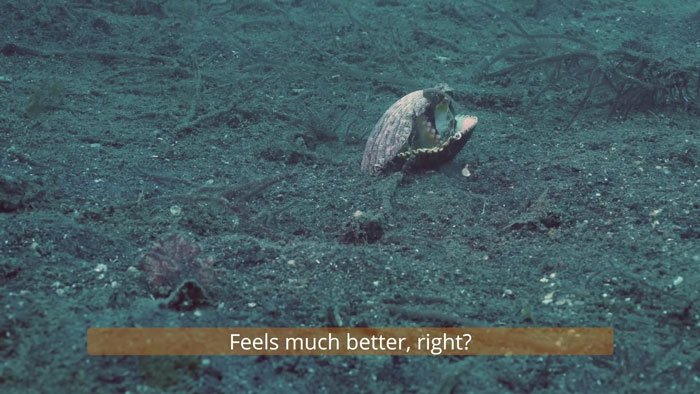Videos
Diver Persuades Baby Octopus to Exchange Plastic Home for a Shell
- This viral video features a delightful moment between a baby octopus with a plastic cup and a diver who wants to trade with a shell.
- Vein octopi commonly scavenge coconuts and clamshells and use them as mobile homes.
- Unfortunately, instead of natural materials, this octopus found a plastic cup to use as refuge.
- Pall Sigurdsson along with other divers, tried to ‘convince’ the creature to ‘switch homes.’
Instead of a coconut or a clamshell, a baby vein octopus took refuge in a plastic cup, which it probably scavenged on the ocean floor. Pall Sigurdsson’s diving buddy found the little octopus and sent him a hand signal to come over and help.
Sigurdsson, an engineer and diving enthusiast from Iceland, passionately films animals he encounters underwater. That day, he and other divers from Lembeh, Indonesia were already in their third dive and was beginning to feel a bit exhausted.
Despite this, they were dedicated in helping the octopus.

Spending the entire dive and most of their oxygen to fulfill the mission, they offered the vein octopus with options.

They kept searching for shells that would finally convince the little animal to ‘move.’

“I am no stranger to seeing octopi making homes out of trash. They are clever animals and use their environment to their advantage, and trash is a permanent part of their environment now,” Sigurdsson said in an interview.
“However the octopus with its soft tentacles did not know that this cup offers virtually no protection, and in a competitive environment like the ocean, this cup was a guaranteed death sentence.”
Vein octopi commonly use clamshells and coconut as mobile homes to protect themselves.

However, in the absence of these materials, they opt for whatever they can find on the ocean floor.

Sadly, a lot of plastic cups, containers, and other trash now contaminate our oceans.
Finally, the vein octopus found a suitable shell.

And slowly transferred to it.

Leaving the dangerous plastic cup behind.

However, it almost forgot the other half of its new shelter.

So Sigurdsson had to help once last time.

Plastics endanger the lives of sea creatures. Whether they accidentally ingest or get entangled with these harmful pollutants, the end result is the same: death.
Ultimately, we human beings suffer in the destruction of marine ecosystems.
“Most trash (including plastic) sinks. Most people only talk about the parts that they can see. The part that floats, but that’s just scratching the surface of the problem. Plastic straws are a minuscule part of the problem,” Sigurdsson explained.
Watch the video:

-
OMG6 years ago
Man Iced Neighbor Who Repeatedly Asked Him “When Are You Getting Married?”
-
Interesting7 years ago
The Secret Meaning of Anklets And Why Some Wives Wear Them
-
Interesting7 years ago
Waking Up Between 3 to 5 AM Could Mean You’re Experiencing Spiritual Awakening
-
Interesting6 years ago
Pork Fat Is Officially One of the World’s Most Nutritious Foods































